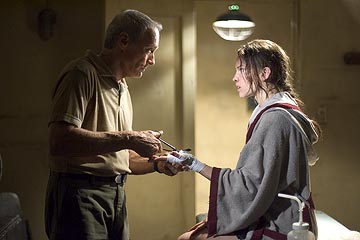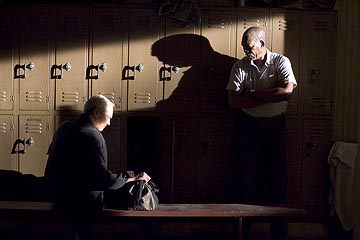

Clint Eastwood has directed films for over thirty years, and has been acting for over fifty. Needless to say, he has a lot of experience in front of and behind the camera, and all of that experience went into directing Million Dollar Baby, his most substantial work in over a decade (this is saying a lot given last year's Mystic River). Not only is the story (based on two of the stories in Rope Burns by F.X. Toole) good, but Eastwood's economical use of all aspects of the film (dialogue, lighting, pacing) elevates it to a higher level. Overall, Million Dollar Baby is an exercise in restraint. Where everybody else would add more, he as a director holds back, making the story feel more intimate. And while boxing may permeate most of the film, Million Dollar Baby is actually about family, and how it applies to three lonely people.
The immediate things that viewers will notice is how dark the film is. Eastwood (Blood Work, Mystic River) shot many of the scenes using a minimum of light, bathing his actors and the surrounding in near total darkness. Hallways, locker rooms, and even entire boxing arenas are dimly lit. What little light there was shone directly on the actors, providing a spotlight of sorts, focusing all of the attention of them. It also allows Eastwood to play with shadows and contrast, simple things that most films today ignore. The lack of light does not make things seem more ominous, it merely increases the sense of isolation that the characters feel. There may be thousands of people around them, but they still feel lonely.
Eastwood is Frankie Dunn, owner of a local gym and a trainer. He is estranged from his ex-wife and daughter, and his gym is pretty much the only thing he has. Because of all he has lost during his lifetime, Dunn exercises restraint in nearly everything he does. He over prepares his fighters out of a sense of protection. Sometimes he is too overprotective, and, in the case of Big Willie Little (Mike Colter), causes his fighter to jump to another manager who is willing to take a risk. His longtime friend (and narrator of the film) Eddie "Scrap-Iron" Dupris (Morgan Freeman, The Big Bounce, Bruce Almighty) works and lives in the gym. Eastwood quickly establishes their longtime friendship with a minimum of dialogue. The two tease each other, but it is instantly clear that their friendship is extremely deep. The rapport and ease between Eastwood and Freeman is fantastic. Into this mix comes Maggie Fitzgerald (Hilary Swank, The Core, Insomnia), a female boxer who wants Dunn to train her.
Well, Dunn doesn't train girls, and he feels Fitzgerald is too old to be a contender. Unperturbed, Fitzgerald, with the help of Dupris, keeps at Dunn until he relents. It's a good choice, since Fitzgerald defeats many of her challengers (out of a combination of her skill and Dunn's training). The two begin to form a father-daughter bond. For Dunn, Fitzgerald becomes the daughter that he lost. Fitzgerald's father died when she was young, and her family disapproves against what she is doing. Boxing is the one thing she enjoys doing, and she knows if that she doesn't have boxing, she will be worthless. "Well, you've got me" Dunn counters. Eastwood portrays the relationship tenderly, with Dunn slowly opening up to the charming Fitzgerald.
There are plenty of boxing scenes in the film, but again, Million Dollar Baby is not squarely centered on boxing. As a result, while the fight scenes are not spectacular, they do serve their purpose. Paul Haggis' (Red Hot) adaptation does take a wild turn in the third act, but again this serves to deepen the characters and the emotional bond they have with each other. Eastwood simply does not waste a single thing. Each shot and every scene of dialogue serves a purpose. He even injects some levity into Million Dollar Baby, especially when dealing with the friendship between Dunn and Dupris. A small subplot about Dupris and one of the gym members (Jay Baruchel, The Rules of Attraction, Almost Famous) serves to deepen Dupris' character, and allows the audience to understand his actions towards Fitzgerald and Dunn better. Eastwood is in top form here, and that puts him light years above most other directors.